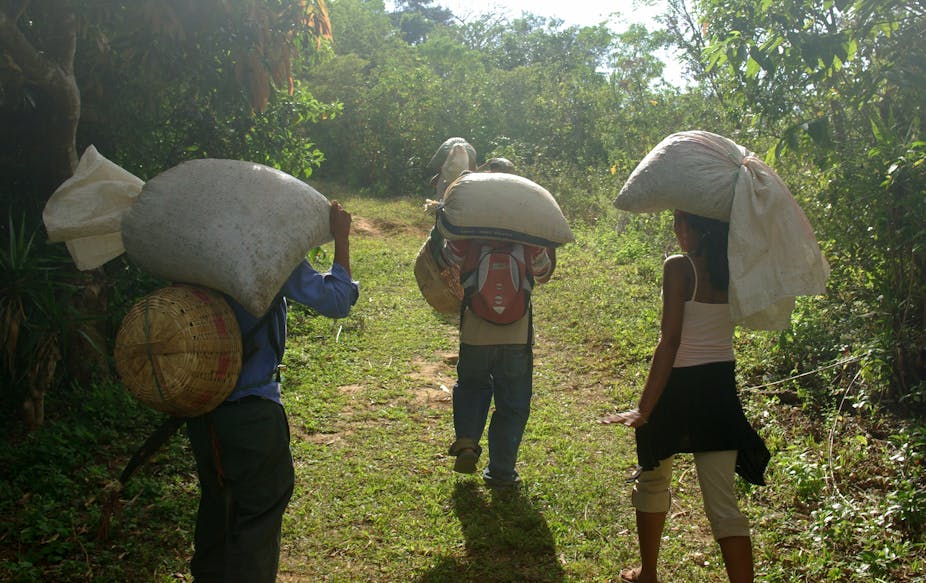Two weeks of campaigning to raise awareness of Fairtrade products have come to a close. But coffee farmers around the world face an ongoing crisis that the Fairtrade Foundation has done little to mitigate and more must be done to address the problems they face of plummeting prices.
Fairtrade is based on a vision to provide marginal farmers with a sustainable livelihood. Yet, farmers are not protected by Fairtrade in the current coffee price crisis and they are struggling to meet the basic costs of production, never mind make a living.
Financial (in)stability
Fairtrade started as an effort to mitigate the crises caused by crashes in commodity prices, such as coffee, helping farmers in the developing world to live a decent life. The Fairtrade Foundation claims that it covers the average costs of production, thereby ensuring a sustainable livelihood for the farmers and their families. It hopes to provide a degree of financial stability to the farmers through long-term trading relationships that provide access to pre-finance access to credit, enabling the farmers to plan their production and invest in the necessary agricultural inputs.
Our fieldwork, undertaken in Costa Rica, Nicaragua and India since 2009, tells a different story. In these countries, some farmers are leaving the Fairtrade scheme since it does not always cover the basic costs of production.
To redress this criticism, in 2011 Fairtrade increased its floor price from US$2.64/kg to US$3.08/kg and also doubled the Fairtrade premium to US$0.44/kg of coffee added to the price. This must be seen in the context of the fall in coffee price on the international market from around US$6.77/kg in 2011 to US$2.55/kg at the end of 2013.
Fairtrade “producer prices” are prices paid to a co-operative of farmers. To be viable for the farmers, they should cover not only the costs of production of the individual farmers, but also the cost of operating the Fairtrade co-operative. This also relates to the processing of coffee beans to enable their export to Fairtrade markets.
Making ends meet
These costs do not decrease when the international market price of coffee drops. In one of the co-operatives that we studied, their cost of production in 2012-13 was US$6.54/kg plus an overhead cost of US$3.27/kg for export-ready coffee while the price on the international market for this was only US$2.13/kg. Hence, there is a limited relationship between the actual costs and the market price.
Even with the Fairtrade floor price and premium, the price would usually be no more than about $3.50/kg which would still not cover the costs of production. This premium must be invested by the co-operative in various projects to improve the lives of its members and their communities, which is a good thing. But, since most of this money is spent at the community level, it does not provide enough income to individual farmers.
To supplement this, co-operatives might join a plethora of other organisations with their own requirements for accountability. All of these different systems with their additional costs must then be maintained by the co-operative.
Diversification and uniformity
Despite a variation among coffee growing countries in terms of their labour, input and living costs, the Fairtrade floor price and premium are the same worldwide as determined by the Fairtrade Foundation. This ensures that the Fairtrade retail partners have a guaranteed price irrespective of the coffee’s origin. This emphasis of the Fairtrade market on export seems to perpetuate a dependency relationship with Northern buyers.
Co-operatives that have given up on Fairtrade certification are using the resources that have been freed up to focus on diversifying their sources of income, growing other crops as well as coffee. This is a positive change where farmers are more independent and have been able to develop local markets for their produce.
To remain relevant, Fairtrade needs to acknowledge these issues. It has an opportunity to be more accountable to southern farmers and fulfil its rhetoric of providing them sustainable livelihoods. If this does not happen, then farmers around the world will continue to say: “Fairtrade is not Fair!” (Mercado Justo no es Justo!)

